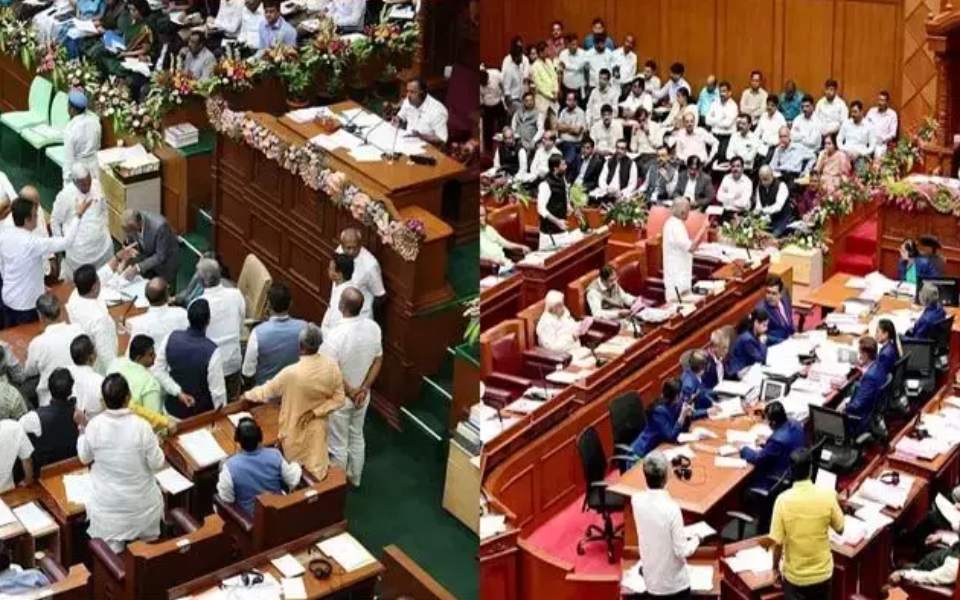Bengaluru, Feb 29: A bill that sought to collect funds from temples with over Rs 10 lakh annual income, which was defeated by the opposition BJP-JD(S) combine in the legislative council last week, was taken up for reconsideration and passed by both houses of the legislature on Thursday.
The Karnataka Hindu Religious Institutions and Charitable Endowments (Amendment) Bill, 2024, will now be sent to the governor for his assent, following which it will become law.
The bill was defeated by a voice vote on February 23 in the upper house, where the opposition has a majority, after it was passed by the assembly on February 21.
After the bill was reconsidered and passed by the legislative assembly once again today, it was sent to the legislative council, where too it got passed, a senior official from the lower house said.
ALSO READ: BBMP budget: Rs 1,580 cr allotted to Brand Bengaluru concept
The council passed the bill it had rejected last week amidst a din, as opposition BJP and JD(S) members protested in the house against the government over the alleged pro-Pakistan slogans chanted in the assembly.
Piloting the bill in the assembly on Thursday, Muzrai Minister Ramalinga Reddy said: "The bill was passed by the assembly earlier, but was defeated in the council. I request the assembly to once again pass the bill."
Speaker U T Khader then put the bill for vote and it was passed by a voice vote.
'Muzrai' refers to grants made by the government for religious and charitable purposes as well as the upkeep of religious and charitable institutions, according to the Karnataka Government Gazetteer. The department of Religious and Charitable Endowments is, hence, popularly known as the Muzrai department. It administers about 35,000 Hindu religious institutions which receive grants from the Government of Karnataka.
The Opposition BJP and the JD(S) were not present in the assembly when the bill was passed on Thursday, as they had staged a walkout earlier in the day, demanding the Congress government's resignation for its "inaction" in nabbing the culprits who allegedly shouted the 'Pakistan zindabad' slogans after Congress member Syed Naseer Hussain was declared elected to the Rajya Sabha.
The Muzrai department's amendment bill had created a huge controversy, as it angered the opposition, especially the BJP, which claimed that the Congress government was trying to fill its "empty coffers" with temple money.
The Congress then sought to turn the tables on the saffron party, pointing out that it had effected an amendment in 2011 to seek funds from high-income Hindu shrines.
The bill among other things, proposes to collect five per cent from temples whose gross income is between Rs 10 lakh and less than Rs one crore, and 10 per cent from temples whose income is above Rs one crore, to be put into a Common Pool Fund, administered by 'Rajya Dharmika Parishath'.
The Common Poll Fund is proposed to be used for the welfare of archakas' (priests) and the upkeep of 'C' category temples (state controlled) whose annual income is less than Rs five lakh.
The act that was earlier amended in 2011 had made way for five per cent of the net income of temples with annual income between Rs five lakh and Rs 10 lakh, and 10 per cent of the net income of temples with annual income of over Rs 10 lakh to come into the fund.
Let the Truth be known. If you read VB and like VB, please be a VB Supporter and Help us deliver the Truth to one and all.
Bengaluru (PTI): The Karnataka government has issued directions to municipal corporations across the state to regulate and prohibit feeding pigeons in public places, citing serious public health concerns.
Deputy Secretary to Government V Lakshmikanth has written to the Urban Development Department requesting it to issue directions to the Greater Bengaluru Authority (GBA) and all municipal corporations to take immediate steps to implement the measures.
In an official note dated December 16 issued by the Health and Family Welfare Department and released to the media on Wednesday, the department said uncontrolled feeding of pigeons in public places has resulted in large congregations of birds, excessive droppings and serious health concerns, particularly respiratory illnesses linked to prolonged exposure to pigeon droppings and feathers such as hypersensitivity pneumonitis and other lung diseases.
ALSO READ: Chinese GPS tracker found on seagull near Karwar Coast
"The commissioner, the Greater Bengaluru Authority and the Commissioners and chief officers of other municipal corporations shall take necessary action to mitigate the causes of dangerous disease spread by pigeon and enforce specified guidelines in their respective jurisdiction," the note said.
According to the department, these include a prohibition on feeding pigeons or causing pigeons to be fed in areas where it may cause nuisance or pose a health hazard to the public. Pigeon feeding shall be permitted only in designated areas in a controlled manner, subject to certain conditions.
"The designated areas may be selected in consultation with stakeholders. The responsibility for upkeep of the designated areas and compliance to the directions shall be taken up by some charitable organisation or an NGO. The feeding in designated areas shall be permitted only for some limited hours in the day," it said.
The note further stated that authorised officers of local authorities shall issue on-the-spot warnings and may impose fines for violation of the order, or lodge complaints to prosecute offenders under Sections 271 (Negligent act likely to spread infection of disease dangerous to life) and 272 (Malignant act likely to spread infection of disease dangerous to life) of the Bharatiya Nyaya Sanhita.
It also directed local authorities to conduct public awareness campaigns, including the display of signboards, banners and digital messages, explaining the health hazards associated with pigeon droppings and feathers, the content of the regulatory directions and penalties for violations, and alternative humane methods of bird conservation that do not endanger public health.





